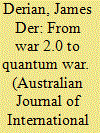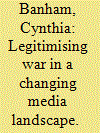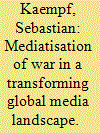|
|
|
Sort Order |
|
|
|
Items / Page
|
|
|
|
|
|
|
| Srl | Item |
| 1 |
ID:
123782


|
|
|
|
|
| Publication |
2013.
|
| Summary/Abstract |
As information networks catalyse local incidents into international crises, as global events appear and disappear on multiple screens at an accelerated pace and as a war of images displaces the image of war, it becomes increasingly difficult to understand the rapidly changing nature of global violence within the confines of security studies. Phase-shifting with each media intervention from states to sub-states, local to global, public to private, organised to chaotic and virtual to real-and back again-global violence superpositions into a quantum war that requires new transdisciplinary, transnational and transmedial approaches.
|
|
|
|
|
|
|
|
|
|
|
|
|
|
|
|
| 2 |
ID:
123785


|
|
|
|
|
| Publication |
2013.
|
| Summary/Abstract |
Internet freedom is rapidly becoming understood as a normative framework for how the Internet should function and be used globally. Recently declared a human right by the United Nations, it also forms a central pillar of the USA's 21st Century Statecraft foreign policy doctrine. This article argues that although there is a clear human rights agenda present in this policy, there is also a power element which is much less discussed or acknowledged in the vast literature on Internet freedom. Through an exploration of both a short history and some important lessons learned about Internet freedom, this article demonstrates how the US Department of State has adapted to the information age in such a way as to harness individual agency (reconceptualised in policy terms as 'civilian power') for the promotion of state power. Although this is by no means as stable or reliable as some more conventional mechanisms, it is an expression of power that meets with few challenges to its legitimacy.
|
|
|
|
|
|
|
|
|
|
|
|
|
|
|
|
| 3 |
ID:
123786


|
|
|
|
|
| Publication |
2013.
|
| Summary/Abstract |
Although much has been written on the abilities of the first-person shooter to advance neo-orientalist themes and US imperial agendas through its aesthetics and narrative, the author argues that by exploiting the porous institutional boundaries between military planners and the video-game industry, the hyperrealist shooter becomes a formidable and formative middle ground not only in reshaping understanding of and access to the nebulous and furtive world of discreet war, but also in filling its legitimacy gap.
|
|
|
|
|
|
|
|
|
|
|
|
|
|
|
|
| 4 |
ID:
123784


|
|
|
|
|
| Publication |
2013.
|
| Summary/Abstract |
The media landscape is undergoing a period of radical transformation, characterised by the decline of the traditional media and the rise of digital new media. This article is concerned with the impact these changes are having on political violence and liberal democracies. The article argues that the emergence of citizen journalism and the decline of traditional journalism signals a dangerous deficit in accountability structures in liberal democracies.
|
|
|
|
|
|
|
|
|
|
|
|
|
|
|
|
| 5 |
ID:
123783


|
|
|
|
|
| Publication |
2013.
|
| Summary/Abstract |
Before the rise of digital new media technology in 2002, 'old' media at its heart displayed a fundamental division between sender and receiver, a division which for a long time had structurally, materially and politically conditioned the nature of the relationship between 'old' media and war. Within the recently emerging digital new media technology, however, this age-old separation between sender and receiver has been eroded. Thus, alongside traditional media platforms, an entirely new form of media technology has arisen. This development has transformed the hitherto multipolar nature of the old media landscape and has led to a heteropolar global media landscape, in which the relationship between media and war has been altered. By exploring how digital new media poles are forming and old media poles are evolving, this article examines how this seismic shift in the global media landscape requires a redefinition of the understanding of the nature of the relationship between media and conflict today.
|
|
|
|
|
|
|
|
|
|
|
|
|
|
|
|
| 6 |
ID:
123781


|
|
|
|
|
| Publication |
2013.
|
| Summary/Abstract |
Media has always been a critical dimension of politics and of political violence. Information about violence and conflict is disseminated through the media. Media is also a mechanism through which the politics of violence is monitored, represented and interpreted. While the historical relationship between old media and political violence has long been the subject of research and debate, how this relationship is affected by the emergence of digital new media technology warrants further consideration. This development raises several important issues and questions for students of international relations, in particular with respect to how the reconfiguration of the role of media in conflict impacts more broadly on configurations of world politics. This article identifies four critical dimensions of world politics through which to explore this impact: the constitution of power, the configuration of agency, the nature and politics of representation, and the constitution of legitimacy. It argues that the concepts of power, agency, representation and legitimacy provide critical interfaces between media, conflict and world politics. In so doing, the article elucidates the conceptual framework that animates this special issue. Finally, it reflects on how these concepts are engaged in the articles to follow.
|
|
|
|
|
|
|
|
|
|
|
|
|
|
|
|
| 7 |
ID:
123787


|
|
|
|
|
| Publication |
2013.
|
| Summary/Abstract |
The dramatic growth of drone warfare in the last decade has meant the arrival of a new kind of war imagery in civilian life: the view through the drone camera. As such, the drone is not simply a weapon, but also an emerging medium for representing conflict. This article explores the ways this imagery has been selected, interpreted, framed and put to use in public and popular culture. In addition to exploring how these practices of looking fit within the larger history of war imagery, two prominent features of 'drone vision' are identified: the promotion of consumer interactivity in the drone war and the militarising of domestic space.
|
|
|
|
|
|
|
|
|
|
|
|
|
|
|
|
|
|
|
|
|